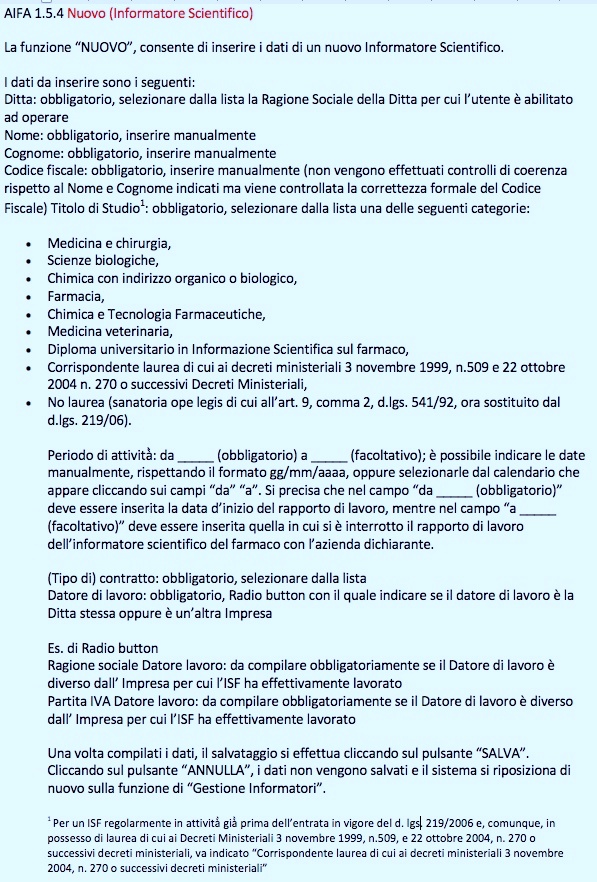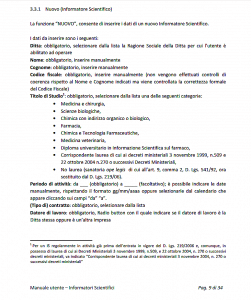How to access the profession of ISF

 [Article 122 of Legislative Decree 219/06] “To access the profession, the candidate must be in possession of the degree pursuant to the law of 19 November 1990, n. 341, or specialist degree pursuant to the decree of the Minister of University and Scientific and Technological Research November 3, 1999, n. 509, or master's degree pursuant to the decree of the Minister of Education, University and Research 22 October 2004, n. 270, in one of the following disciplines or in one of the scientific-disciplinary sectors to which the declarations themselves refer medicine and surgery, life sciences, organic or biological chemistry, pharmacy, pharmaceutical chemistry and technology, or veterinary medicine. Alternatively, scientific representatives must be in possession of the university diploma (or degree) in scientific information on drugs pursuant to the decree of the Minister of University and Scientific and Technological Research of 30 June 1993, published in the Official Gazette of the Italian Republic no. 87 of 15 April 1994, or the corresponding degree of which
[Article 122 of Legislative Decree 219/06] “To access the profession, the candidate must be in possession of the degree pursuant to the law of 19 November 1990, n. 341, or specialist degree pursuant to the decree of the Minister of University and Scientific and Technological Research November 3, 1999, n. 509, or master's degree pursuant to the decree of the Minister of Education, University and Research 22 October 2004, n. 270, in one of the following disciplines or in one of the scientific-disciplinary sectors to which the declarations themselves refer medicine and surgery, life sciences, organic or biological chemistry, pharmacy, pharmaceutical chemistry and technology, or veterinary medicine. Alternatively, scientific representatives must be in possession of the university diploma (or degree) in scientific information on drugs pursuant to the decree of the Minister of University and Scientific and Technological Research of 30 June 1993, published in the Official Gazette of the Italian Republic no. 87 of 15 April 1994, or the corresponding degree of which  to the aforementioned ministerial decrees of 3 November 1999, n. 509, and 22 October 2004, n. 270. The Minister of Health may, after hearing the Ministry of Education, University and Research, by decree, recognize other degrees as suitable for the purposes of this article, specifying the teachings essential for training purposes. In all cases, scientific reps must receive adequate training from the companies they depend on, so as to be in possession of sufficient scientific knowledge to provide accurate and as complete information on the medicines presented. The companies holding marketing authorizations ensure the constant updating of the technical and scientific training of scientific reps (Legislative Decree 24 April 2006, n. 219).”
to the aforementioned ministerial decrees of 3 November 1999, n. 509, and 22 October 2004, n. 270. The Minister of Health may, after hearing the Ministry of Education, University and Research, by decree, recognize other degrees as suitable for the purposes of this article, specifying the teachings essential for training purposes. In all cases, scientific reps must receive adequate training from the companies they depend on, so as to be in possession of sufficient scientific knowledge to provide accurate and as complete information on the medicines presented. The companies holding marketing authorizations ensure the constant updating of the technical and scientific training of scientific reps (Legislative Decree 24 April 2006, n. 219).”
Non-graduated ISFs benefit from an amnesty for situations regularly in place on the date of entry into force of decree 219/06, i.e. on 6 July 2006. (see "What amnesty for non-graduated ISF?)
Before starting his activity, the scientific representative must also attend a long and in-depth company training course, which will allow him to know all the characteristics of the medicinal specialties produced by the company for which he will work.
The ISF will also participate in continuous company and, in some cases, associative (FEDAIISF) refresher courses, which will guarantee its high professionalism at all times.
MIUR – Equating old system degrees to new system degrees Interministerial Decree of 9 July 2009
Equiparazione_lauree triennali DM_509_DM_270
DECREE 1 September 2009 MINISTRY OF LABOR, HEALTH AND SOCIAL POLICIES Recognition of thesuitability of other degrees for the purposes of carrying out the activity of pharmaceutical scientific informant. (09A11478) (GU General Series n.229 of 2-10-2009)
1) Class 62/S – Class of specialist degrees in Chemical Sciences;
2) Class LM-54 – Class of master's degrees in Chemical Sciences;
provided that the exams in pharmaceutical chemistry, pharmacology, pharmaceutical technique and legislation have been passed, either during the degree course or in specific postgraduate courses
Note: Equivalency degree in Chemistry under the old system with a degree in organic chemistry. QUESTION TO WRITTEN ANSWER 4/20707 tabled on 12/11/1998 by Giuliano Pasquale Legislature: 13
With the Decree August 3, 2007, published in the Official Gazette No. 198 of 27 August 2007, are admitted to carry out the activity of ISF also there degree in natural sciences LM-60 and all the specialist or master's degree courses belonging to it at the class 9/S and LM-9 – Class of specialist degrees in medical, veterinary and pharmaceutical biotechnology and class 68/S – Class of specialist degrees in natural sciences. Class 1 degrees are also admitted – Class of degrees in biotechnology, Now Class L-02 – and class 24 – Class of degrees in pharmaceutical sciences and technologies (Now Class L-29) provided that the exams in pharmacology, pathology, toxicology, medicinal and toxicological chemistry, pharmaceutical technology and legislation have been passed.
Ministerial Decree November 11, 2011 Official Gazette February 22, 2012, n. 44 "Equivalence of diplomas of schools directed to special purposes": Cosmetologist technician equated to L-29 Pharmaceutical sciences and technologies
If you have one of the degrees described above or an equivalent degree, you can work as an informant.
→ AIFA. Company Manual for ISF←
 EQUAPARATION BETWEEN DEGREE CLASSES DM 509 AND DEGREE CLASSES DM 270
EQUAPARATION BETWEEN DEGREE CLASSES DM 509 AND DEGREE CLASSES DM 270
INDEX OF 1ST LEVEL DEGREE CLASSES (L) – Three-year degrees
Scientific information on the drug belongs to Degree class L-29 “Pharmaceutical science and technology”. Equations between University Diplomas L. 341/90, Degrees in the classes DM 509/99 and Degrees in the classes DM 270/04 Scientific information on drugs (UNIVERSITY DIPLOMAS L. 341/90) equivalent to 24 Pharmaceutical sciences and technologies (DEGREES IN THE DM 509 CLASS /99) and L-29 Pharmaceutical Sciences and Technologies (DEGREE OF THE CLASS DM 270/04). (Table 2 of the MIUR)
EQUIPOLLENCE and EQUAPARATION
Equipollenza is between different academic qualifications considered analogous for the purposes of public competitions. Equiparations is said of the degree diplomas (DL) according to the old system, "equivalent" to the new classes of specialist and master's degrees.
The terms "equivalence" and "equalization” indicate the presence of an equivalence between qualifications which has legal effect. To say that two educational qualifications are equivalent or comparable implies establishing that the educational qualifications: a) certify the acquisition of equivalent skills; b) allow admission to public competitions; c) they are valid for the purposes of admission to state exams and access to professional orders; d) allow the continuation of the course of study at a higher level. With special decrees, the Ministry of Education, University and Research (MIUR) has established the equivalences and equivalences between qualifications of the old and new regulations.
- the equivalence is not reciprocal, but "one-way", i.e., if a security X is equivalent to security Y, security Y is not automatically equivalent to X.
- the equivalences are valid and operate exclusively for the degrees expressly mentioned in the relative equivalence decrees and therefore cannot be extended according to a transitive property to other degrees (e.g. if a title x is equivalent to a title y and the title ye is equivalent to title z, the title x is not equivalent to title z).
Equivalence between qualifications of different regulations for access to public competitions
The Equivalence for access to public competitions, between Old System Degrees, Specialist Degrees and Master's Degrees are established by a series of provisions and in particular by the Interministerial Decree of 9 July 2009. Equivalence between degrees of different systems must be understood only in a strictly alternative way. Therefore, where a degree of the old system corresponds to several classes of specialist or master's degrees, it will be the task of the University that awarded the degree diploma to issue, to those who request it, a certificate attesting to which single class the qualification possessed is equivalent, to be attached to the applications for participation in the competitions together with the degree certificate.
NB.: Legislative Decree 219 of 2006 refers to the degree titles for ISF present in that year. However, the academic regulations of 2007 and 2009 contemplate new degree courses that did not exist in 2006 or degree courses that derive from them.
With the Decree August 3, 2007 and with the DECREE 1 September 2009 the titles then present were partially adapted to the reality of the new order.
The equivalence and equalization decrees refer to public competitions, but precisely because they are public they give legal value to equalization or equivalence between degrees. However, Aifa does not recognize the validity and applicability of the equivalences to the case of the ISF. To learn more, see: Legal value of equivalences and equivalence of educational qualifications for the activity of the ISF
It is unacceptable to believe that the equivalence between qualifications exists on the basis of a sort of "transitive property" or derivative equivalence without the aforementioned interchange between one and the other specialization entailing a "nullification" of the legislation itself on the subject of equivalence and affinity. Given the exceptional nature of the rules establishing the equivalence of qualifications, the possibility that these are susceptible to analogical interpretation must be excluded, given that it is keep one qualification absorbing compared to another, either because the latter is preparatory to the first or because the former deals with the same, fundamental subjects of the other, but in a more in-depth manner, or to consider the equivalence between several qualifications, a regulatory act is required; the equivalence between qualifications can in fact be established only by primary or secondary standards and not, instead, by the Administration or the judge, on the basis of assessments on the extent of the exams taken or on the possible absorbance of one qualification compared to another. (Lawyer Ennio Grassini – www.dirittosanitario.net)
There is the ISTAT Professional Code 2.1.1.2.2 - Pharma company sale representative. To be used to communicate, disseminate and exchange internationally comparable statistical and administrative data on occupations; however, this instrument should not be understood as an instrument for regulating professions. In 2007 they were reformed (ATECO classification 2007):
Today there is 1 ATECO Code for the Scientific informants:
- ATECO code 74.90.99 – Other Professional Activities NCA
This ATECO Code is part of the Professional Category. In this case it will not be necessary to register with the Chamber of Commerce and to the Merchants and Artisans Management for the payment of your INPS social security contributions, you will also need to register with the INPS Separate Management which provides for the payment of your INPS contributions as a percentage of your Gross income (percentage of 25.72% from 1 January 2017).
(Pharmaceutical and cosmetic product broker: ATECO code 46.18.34)
 NB for COMPANIES: The pharmaceutical company must communicate to AIFA the list of scientific representatives employed during the previous year, with an indication of the educational qualification and the type of employment contract with the pharmaceutical company (art. 122, paragraph 1, Legislative Decree 219/06). For this purpose, AIFA has prepared a computerized form to be filled in with the data required by law.
NB for COMPANIES: The pharmaceutical company must communicate to AIFA the list of scientific representatives employed during the previous year, with an indication of the educational qualification and the type of employment contract with the pharmaceutical company (art. 122, paragraph 1, Legislative Decree 219/06). For this purpose, AIFA has prepared a computerized form to be filled in with the data required by law.
In Sheet 3, AIFA – Computerized form for scientific informers, – Scientific Informant Data (IS) – the fields “qualification of study”, “contract” and “employer” are predefined drop-down selections (alternative wordings are not acceptable). So if you are not in possession of one of the degrees listed in art. 122 of Legislative Decree 219/06 but the wording "Corresponding degree pursuant to ministerial decrees of 3 November 1999, n. 509, and 22 October 2004, n. 270 or subsequent ministerial decreesthe". Data to be included in the AIFA form: click on the image to the right
AIFA. Scientific Informers User Manual
STATE EXAMINATION
The legislation in force prescribes that, in order to be able to practice the profession corresponding to their degree title, graduates must pass a state exam aimed at obtaining the qualification for this exercise and therefore to be able to enroll in the relevant Professional Register.
In the field of regulated liberal professions, protected by a professional order (lawyers, journalists, engineers, doctors, pharmacists, veterinarians, etc.), the legal qualification for the qualification to practice the profession is identified with the state exam.
In other cases, not protected by professional orders with a Register or College, the degree itself is a qualifying title.
At the Ministry of Education, University and Research (MIUR) a project is being studied which tends to modify the degree exam, making sure that - at the same time - students can also obtain the qualification to practice.
Pharmaceutical Representatives (ISF), despite being regulated by the Legislative Decree 219/06despite being a profession intellectual, scientific and highly specializedalthough there is one specific degree, do not have a Professional Register, so no state exam is required to practice the profession of ISF.
ABROAD
The free movement of professionals in the European Union is ensured
The recognition of Italian professional qualifications (doctor, engineer, lawyer, dentist, biologist, social worker, physiotherapist, etc.) in member countries of the European Union (France, Germany, Spain, United Kingdom, Ireland, Portugal, Greece, Belgium, Luxembourg, Netherlands, Denmark, Austria, Sweden, Finland) and the European Economic Area (Norway, Iceland, Liechtenstein) is regulated by a series of general or sectoral directives
Italian citizens interested in having their academic qualifications recognized abroad can therefore apply directly to the national center (NARIC or ENIC)
An Italian professional who intends to obtain recognition of his or her professional title in one of the countries of the European Union or the European Economic Area can request information on the methods of recognition from the respective national information centres on the recognition of professional qualifications.
See also CIMEA Mobility Information Center for Academic Equivalences, “Recognition of academic qualifications“, “Recognition of professional qualifications" And European guide on the recognition of professional qualifications”
For further information and details, consult the page "Recognition of foreign qualification for ISF in Italy”
Riconoscimento Titoli accademici esteri
Recognition of health professions qualifications
Related topics
What is the salary of a Scientific Informant
INPS contributions for pension purposes. Is it worth the redemption of the degree?
Research of General Practitioners and Paediatricians of Free Choice
Fedaisf. Rules for the ISF for the storage and transport of medicinal samples. – (Article 125 – Free samples)
CCNL 13 June 2022 – The national employment contract of the ISF 2015 (CCNL 09.22.2012) – National Collective Bargaining Agreement pag. 337 – RENEWAL OF THE CHEMICAL-PHARMACEUTICAL CCNL 1/01/19-31/06/22
ISF extension. Self-employed with VAT number or employee (Enasarco)
ISF extension. The business agent contract
ISF in the pharmacy. What is legal and what is not
The responsibility of the employer and the ISF
Expired drugs – Fedaisf. Rules for the ISF for the storage and transport of medicinal samples.
Disciplinary sanctions of workers – Court settlement. Taxability of early retirement incentives, non-taxability of biological and/or professional damage – The Tracking
Types of contracts after the Jobs Act
Fonchim and Faschim, supplementary pension fund and supplementary health fund
Cassation. The scientific informant is not a commercial agent – On the subordinate nature of the activity carried out by the scientific medical informant
IMS data – Agreement between IMS HEALTH and AIISF [Algorithms n, 107, 2000, p. 6] – IMS data evaluation – What is the value of IMS data? Can they be verified? – IMS data is less and less reliable – List of micro-areas Microbrick_Brick
Can an employee be fired after an illness? – Tax visit. When the employee on sick leave does not have to respect the availability times
The EFPIA Code of Conduct. Transparency on transfers of value from pharmaceutical companies to healthcare professionals
Farmindustria Codes of Conduct And EFPIA extension
The penalties provided for by Legislative Decree 219/06
Powdered milk for babies: what the law says
Supplements. Law and guidelines
Nutraceuticals, cosmoceuticals, devices
The ISF Register. The story of a denied right. ISF extension. From Morabito's film to reality. The hidden truths
The reason for a Register of ISF
DDL No. 404-D Establishment of the ISF Register 2006
AIFA Pharmaceutical whistleblowers in Italy 2008 (from the BIF XVI No. 3 2009)
